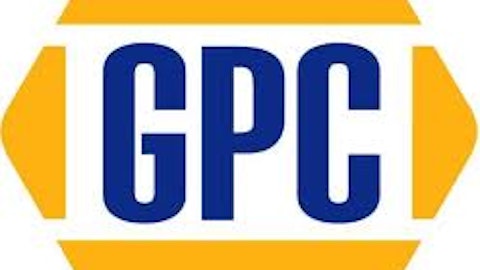According to a 13G filed with the SEC, Glenhill Advisors owns 2.7 million shares of The Pep Boys – Manny, Moe & Jack (NYSE:PBY), an auto parts retailer and auto maintenance company with a market capitalization of about $650 million (on average over 400,000 shares are traded per day, so with the current market price above $12 there is plenty of dollar volume for most investors). We track quarterly 13F filings from hundreds of hedge funds and other notable investors as part of our work researching investment strategies (for example, we have found that the most popular small cap stocks among hedge funds earn an average excess return of 18 percentage points per year) and can see that Glenhill’s current position is an increase over the 1.6 million shares it had owned as of the end of March (find Glenhill’s favorite stocks). The fund now owns 5% of the total shares outstanding.
The first quarter of The Pep Boys – Manny, Moe & Jack (NYSE:PBY)’s fiscal year ended in early May. The company’s 10-Q shows that both merchandise and service revenue edged up versus a year earlier, causing a 2% increase in total sales. This was offset by higher costs, however, and so The Pep Boys – Manny, Moe & Jack (NYSE:PBY) earned essentially no pretax income for the quarter (reported earnings did increase, but this was only because of an income tax benefit). Pep Boys generated a bit over $9 million in cash flow from operations, down considerably from the prior year period and also a bit less than the cash which the business used on capital expenditures.

We can compare The Pep Boys – Manny, Moe & Jack (NYSE:PBY) to Advance Auto Parts, Inc. (NYSE:AAP), AutoZone, Inc. (NYSE:AZO), and O’Reilly Automotive Inc (NASDAQ:ORLY). O’Reilly Automotive is the most expensive of these peers on a trailing basis, though even it is still priced at a discount to The Pep Boys – Manny, Moe & Jack (NYSE:PBY) with a trailing earnings multiple of 24. In its most recent quarterly report revenue and earnings were up only modestly compared to the first quarter of 2012, and so it doesn’t seem like a good buy at this valuation.
Advance Auto Parts and AutoZone, meanwhile, carry trailing P/Es in the 16-17 range. In each case, the sell-side is forecasting something of an increase in earnings per share over the next year and a half with the result being that each’s valuation comes out to 14 times forward earnings estimates. Both of these companies also grew their revenue slightly in their most recent quarterly report compared to the same period in the previous fiscal year. In AutoZone’s case, this was accompanied by growth on the bottom line as well, though perhaps not as much as we would like at its current valuation. We’d also note that AutoZone features a beta of 0.2, meaning it is quite insulated from market conditions. Advance wasn’t able to grow its earnings going by its most recent report, despite the increase in sales at that company, and given that its valuation is dependent on future increases in net income we would avoid it.
Auto parts stores don’t seem to be doing too well in general, and Pep Boys appears to be the modest dependent of the group on improving its business over the next several years in the sense that its earnings multiples are quite high relative to its peers. We don’t see what Glenhill is looking for in the company, and in fact the other stocks we looked at don’t seem to have a good mix of valuation and financial performance either.
Disclosure: I own no shares of any stocks mentioned in this article.



